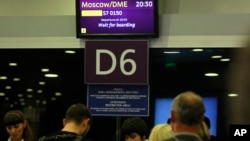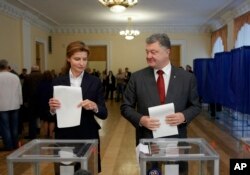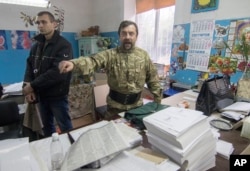Direct airline flights between Russia and Ukraine have stopped.
The move announced last month by Kyiv is the latest in a series of tit-for-tat measures imposed over the conflict in Ukraine. The ban began at midnight, after talks to avoid it failed last week.
About 70,000 passengers a month will be affected and analysts said it will be especially costly to Russian airlines.
Meanwhile, Ukrainians are voting Sunday in elections for local councils, chairmen of rural councils, and city and town mayors.
The vote is seen as a test Ukrainian President Petro Poroshenko's loose-knit coalition's policies aimed at applying for EU membership by 2020.
U.S. Ambassador to Ukraine Geoffrey Pyatt said Sunday that after last year's presidential and legislative polls the local elections are "... an opportunity to complete the democratic reset of Ukraine’s political system."
Ukrainians
Pyatt said he believes the most important winner is the Ukrainian people, so it is important that the process unfold in a way that is transparent and consistent with Ukrainian law.
But the election has been marred by the postponement of the vote in Mariupol, the southeastern city that could act as a land bridge between pro-Moscow rebel regions and the Russian-annexed Crimea peninsula.
The Mariupol vote was pushed back to next month "due to what Poroshenko's Solidarity party said was the improper preparation of election ballots, the absence of control over their printing and number, and reliable storage.
Poroshenko called the delay "categorically unacceptable" and demanded a swift investigation.
Ukraine's Moscow-allied Opposition Bloc called the cancellation "a blow to the image of Ukraine as a democratic and law-bound country that could put the entire peace process (with pro-Russian insurgents) at risk."
Ambassador Pyatt said he welcomes the Ukrainian leader's "intent to have a thorough investigation and his commitment to ensuring that the people of Mariupol, like all citizens of Ukraine, are able to make their own democratic choice."







